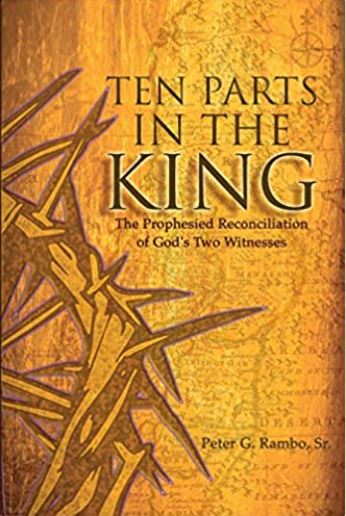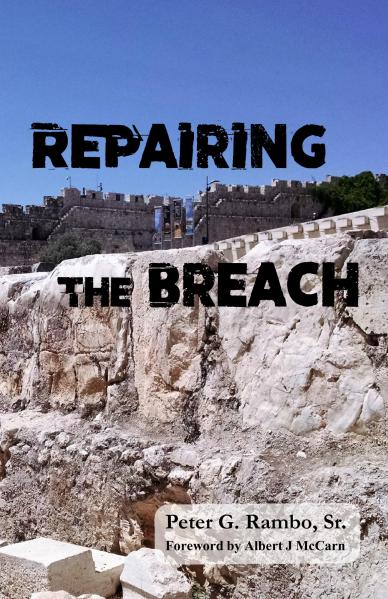II Thessalonians 2:3, in a passage about the last days, says,
Let no man deceive you by any means: for that day shall not come, except there come a falling away first, and that man of sin be revealed, the son of perdition;
Ever wondered what the ‘falling away’ or, in some translations, ‘apostasy’ will be? How does it relate to ‘the man of sin?’
This will be a short study to help the reader identify and understand what the ‘apostasy’ is and what the defining characteristic is of THE man of sin. Students of prophecy will be particularly interested. (A quick side note: We should ALL be students of prophecy for two very good reasons: 1.) More than 1/3 of Scripture is prophetic on some level!! and 2.) The testimony of Yeshua IS the Spirit of Prophecy!)
Let’s start with ‘apostasy.’
Webster’s Online Dictionary defines apostasy as:
1. The state of having rejected your religious beliefs or your political party or a cause (often in favor of opposing beliefs or causes).
2. The act of abandoning a party for cause.
3. An abandonment of what one has voluntarily professed; a total desertion of departure from one’s faith, principles, or party; esp., the renunciation of a religious faith; as, Julian’s apostasy from Christianity.
Wikipedia defines ‘Apostasy in Christianity‘ as:
Apostasy in Christianity refers to the rejection of Christianity by someone who formerly was a Christian. The term apostasy comes from the Greek word apostasia (“ἀποστασία“) meaning defection, departure, revolt or rebellion. It has been described as “a willful falling away from, or rebellion against, Christianity. Apostasy is the rejection of Christ by one who has been a Christian….”[2] “Apostasy is a theological category describing those who have voluntarily and consciously abandoned their faith in the God of the covenant, who manifests himself most completely in Jesus Christ.”[3] “Apostasy is the antonym of conversion; it is deconversion.”[1]
Wiki goes on to say,
The Greek noun apostasia (rebellion, abandonment, state of apostasy, defection)[6] is found only twice in the New Testament (Acts 21:21; 2 Thessalonians 2:3).
Wiki goes on to expand the definition in broader terms through other Scripture, but for our purposes, let’s consider the only two uses of the Greek word ‘apostasia’ and its immediate context. Doing so will tell us EXACTLY what ‘apostasy’ is and clearly show something Christendom rarely teaches…
We have already read 2 Thessalonians 2:3, but I’d like to place it here in a couple different translations for clarity and then place it in a larger context:
NASB: 3 Let no one in any way deceive you, for it will not come unless the [d]apostasy comes first, and the man of lawlessness is revealed, the son of destruction,
OJB: 3 Let no one in any way lead you astray, because, unless the Merid (Rebellion, Revolt, the [Anti-Moshiach] Shmad Betrayal Defection of Apostasy, the Azivah Abandonment) Desertion comes rishonah (first), and the Apocalypse of the Ish HaMufkarut (Man of Lawlessness), the Ish HaChatta’ah Ben HaAvaddon (Man of Sin, Son of Destruction Anti-Moshiach) is unveiled.
NIV: 3 Don’t let anyone deceive you in any way, for that day will not come until the rebellion occurs and the man of lawlessness[a] is revealed, the man doomed to destruction.
And, the larger context from the NASB; (Please take the time to read carefully!!)
2 Now we request you, brethren, with regard to the [a]coming of our Lord Jesus Christ and our gathering together to Him, 2 that you not be quickly shaken from your [b]composure or be disturbed either by a spirit or a [c]message or a letter as if from us, to the effect that the day of the Lord has come. 3 Let no one in any way deceive you, for it will not come unless the [d]apostasy comes first, and the man of lawlessness is revealed, the son of destruction, 4 who opposes and exalts himself above [e]every so-called god or object of worship, so that he takes his seat in the temple of God, displaying himself as being God. 5 Do you not remember that while I was still with you, I was telling you these things? 6 And you know what restrains him now, so that in his time he will be revealed. 7 For the mystery of lawlessness is already at work; only he who now restrains will do so until he is taken out of the way. 8 Then that lawless one will be revealed whom the Lord will slay with the breath of His mouth and bring to an end by the appearance of His [f]coming; 9 that is, the one whose [g]coming is in accord with the activity of Satan, with all power and [h]signs and false wonders, 10 and with [i]all the deception of wickedness for those who perish, because they did not receive the love of the truth so as to be saved.
It is important to note that this ‘rebellion,’ ‘falling away,’ or ‘apostasy’ is connected with ‘lawlessness,’ but let’s look at our other reference before nailing this down.
Acts 21 relates Rav Shaul (Apostle Paul’s) coming to Jerusalem for Shavuot (Pentecost). He meets with Ya’acov (James) and the brethren to give a report of the work among the Gentiles. Verses 20-21 tell us,
20 And when they heard it they began glorifying God; and they said to him, “You see, brother, how many [a]thousands there are among the Jews of those who have believed, and they are all zealous for the Law (Torah); 21 and they have been told about you, that you are teaching all the Jews who are among the Gentiles to forsake (apostasia) Moses, telling them not to circumcise their children nor to [b]walk according to the customs.
The larger context explains that Rav Shaul agree to take a Nazarite vow, offer sacrifices and purify himself as well as paying for four other men of like mind, to demonstrate that he (Shaul) has NOT taught against the Torah of Moses.
The point is that we again see ‘apostasia’ in connection with Torah. Specifically, it is used to denote ‘forsaking Moses’ and emphasis in this passage is placed upon ‘the Jews… who have believed’ and the fact that they are ‘zealous for the Torah.’
The first passage we see uses ‘lawlessness’ in connection with the ‘apostasia’ and points to ‘the man of sin’ or ‘man of lawlessness.’
I John 3:4 says,
4 Everyone who practices sin also practices lawlessness; and sin is lawlessness.
Interestingly, both passages wherein we see the term ‘apostasia’ refer to ‘lawlessness.’ 2 Thessalonians, in parallel and Acts 21 in juxtaposition. Clearly, ‘apostasia’ IS lawlessness, or ‘forsaking Moses.’
Yeshua, in Matthew 7, says to some who call Him ‘Lord’ and even cast out demons and perform miracles in His name,
‘I never knew you; depart from Me, you who practice lawlessness.’
The short of it is this: The apostasy is rejection of Torah. It is Lawlessness.
Yeshua doesn’t judge them for ‘keeping the Torah!’ He judges them for NOT keeping the Torah.
Let’s go back to the end of the quoted 2 Thessalonians passage to see a sad statement,
…because they did not receive the love of the truth so as to be saved. 11 For this reason God [j]will send upon them [k]a deluding influence so that they will believe [l]what is false, 12 in order that they all may be [m]judged who did not believe the truth, but [n]took pleasure in wickedness. 2 Thessalonians 2:10-11
Christendom in general is taught to reject the Torah. It is taught that only parts apply, but a simple study of Scripture reveals several glaring things:
- The Sabbath Day was NEVER changed.
- The dietary laws were never abolished.
- The Feasts of Yahweh STILL stand.
- etc…
Those are the biggies that are totally ignored by most of Christendom and theologians/pastors do admirable gymnastic moves to avoid the obvious and clear teachings of Scripture. Interestingly, a huge swath of believers are awakening and embracing the simple requests the Father makes of His children. (This blog is just one small voice in a growing throng!! Dear reader, please study this out!! Read this blog and use our Resources page.)
Having defined ‘apostasy,’ and the word ‘lawlessness,’ according to Scripture, defining ‘the man of sin,’ or ‘man of lawlessness,’ becomes a simple task. He is the one who claims to be god and openly violates the Torah. Notice who he persecutes:
So the dragon was enraged with the woman, and went off to make war with the rest of her [a]children, who keep the commandments of God and hold to the testimony of Jesus. Rev. 12:17
Who perseveres?
Here is the [a]perseverance of the [b]saints who keep the commandments of God and [c]their faith in Jesus. Rev. 14:12
Make no mistake! The man of sin, while destroying everything, has as his greatest concern, those who keep the commandments AND have the testimony of Yeshua.
Most of Christendom only has half of that. Most of Judaism only has half of that.
The truest enemies of the man of lawlessness, and thereby the greatest friends of God, have both! They keep the commandments AND have the testimony of Yeshua!!
Now you know what the ‘apostasy’ is and what the defining character trait of the man of lawlessness is.
Are you apostate?
Have you ‘forsaken Moses?’
Or, are you a believer in Yeshua who is ‘zealous for the Torah?’
I pray you are the latter!!
Be a Berean and search the Scriptures to see if this be not the truth!!




















































































































Luv this one you big heretic, lol!
LikeLike
Heretic… LOL!
Yep. I need a t-shirt for family gatherings…. So funny how painfully they avoid certain topics.
LikeLike
Here’s a good one… got colors, too!
http://www.zazzle.com/heretic_t_shirt-235412549363983625
LikeLike
I sent Michael Rood a request to make me a tshirt thats says Judaizer…I get it enough lol
LikeLike